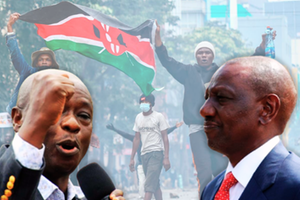
Maria Sarungi Tsehai, a Tanzanian Journalist who was abducted in Nairobi on January 12 before she was released addressing journalists at Amnesty International offices on January 13,2025.
By the time her abductors set her free, Maria Sarungi was disoriented, scared, her head, which was constantly pinned to the floor of the vehicle, aching and her hand, numb from the tight grip of the handcuffs used to restrain her movement.
In her estimation, the entire ordeal at the hands of the four armed men lasted four hours after she was yanked out of the taxi she had ordered at Chaka Place in Kilimani, Nairobi, to take her back home shortly after visiting her salon.
Speaking for the first time since her release on Sunday evening, Ms Sarungi, a Tanzanian political activist and businesswoman, on Monday accused the Tanzanian government, in collaboration with some Kenyan security officers, of her kidnap and torture.
It was almost 3 pm, January 12, 2024, when she left the salon and informed her husband, David Tsehai, that she was heading back home.
What she did not know was that there was a team of four armed men watching her moves and waiting for the perfect moment to pounce on her.
All went on as usual for the activist who boarded her taxi and relaxed in her seat with her mind set on reaching home.
Just as they were about to leave, a black Toyota Noah blocked their way, with the armed men shouting at the taxi driver to stop the vehicle and open doors.
“I started screaming immediately and told the driver not to open the door. Unfortunately, those men, who later on identified themselves as police officers, managed to open the car and forced me out of the taxi,” Ms Sarungi said.
She did not go without a fight. She recalls punching, screaming and kicking as her assailants pushed her into their vehicle, which sped off as soon as they got her. The men then blindfolded and handcuffed her shortly after the vehicle was powered.
Though she could not see clearly through the fabric of the cloth used to blindfold her, she noticed that a driver of a bus, who noticed the commotion, attempted to block the vehicle but the abductors managed to squeeze their way through.
“I was actually surprised that the driver of the bus that I have since come to understand was a Citi Hoppa, did not even know me but still attempted to rescue me,” she said.
Inside the car, one man was assigned the role of holding her and ensuring she did not attempt to flee.
Read: ODPC overstepping on High Court jurisdiction to determine cases on privacy rights: Lawyer argues
At the front, the driver sat with another man who only spoke in Swahili, trying to get Ms Sarungi’s personal details— including her name and passwords to her phone in order to access some information.
The captors kept asking if her name was Maria but she declined to give her identity and spoke only in English.
She also told them that since they abducted her, they must have had some information about her.
“Whenever I told them that they had abducted me, they got very angry and insisted that they had not abducted me, saying that they were police officers and were taking me to a police station,” she said.
Alarmed by how long the journey to the station was taking since Kilimani Police Station is barely a few minutes’ drive from Chaka, she consistently kept asking them where they were taking her, but they asked her to shut up.
At some point, the men would ask her to be very silent and not dare to move.
“I suspect these were most likely security checks. This shows that this operation to abduct me was not official because had it been so, they would have even had escort cars to clear the road,” she said.
Though she could not see the road, Ms Sarungi is certain that the intention of her captors was to take her to Tanzania where she said she is being sought for by the current administration for her fiery criticism of its governance style.
Judging by the speed of the vehicle and the nature of the bumps on the road, the celebrated journalist and social media influencer concluded that they were on a highway that was heading straight to one of the main border points of Kenya and Tanzania.
The man at the front seat, she recalled, was speaking with Tanzanian Swahili accent.
“Having stayed in Kenya for a few years, I can easily distinguish a Kenyan accent from a Tanzanian one. I am sure that was a Tanzanian which makes me say that the Tanzanian government was involved,” she said.
After what appeared to be a lifetime of driving, the vehicle left the highway and joined a murram road, went on for some minutes before stopping. This was around the fifth and final stop.
During the other stops, only two men left and when she once asked why they stopped, one of the men told her that they were waiting for instructions from the “boss” but did not disclose who the “boss” was.
This revelation, she said, made her conclude that her abduction was premeditated and well-choreographed.
At this final stop however, three of the men alighted and went some distance away for a consultation. They left her still held tightly by one of their colleagues who did not at any point let her seat comfortably.
This man, she recalled, kept strangling her and tightening the handcuffs whenever she took some time before answering the barrage of questions thrown at her.
At some point, she had to tell them to let her gather her thoughts because their torturous tactics, the pain from the handcuffs and the shock from all the happenings disoriented her.
“The men then came back and told me they were setting me free and told me not to look back until the car left and that I should not tell anyone about what had happened,” she said.
That place was deserted and the fact that it was getting dark did nothing to help her know where she was.
From a distance, she could see the headlights of vehicles crossing a certain road and began walking towards that direction.
It took her several minutes to get to the road where she tried to stop a few cars but most were already occupied and did not stop.
By chance, she saw two vehicles and one of the drivers told her he was a taxi driver. She enquired how much it would cost to get to her home in Kilimani. She however did not ask the driver where they were, she was so scared and only wanted to go home.
“The driver told me Sh1,000 which I paid because the men returned my pouch which had my personal items and some Sh2,050. Unfortunately, they went with my phone. It must have been almost 7 pm by then judging by the darkness,” she said.
Her mind was still woozy, filled with trepidation and when she recollected herself, they were along Ngong Road.
Minutes later, she was at her gate where she paid the driver, rushed into the house and made a call to her husband using her laptop.
That is when the message of her release reached other parties who were concerned about her ordeal.
“I am very grateful to Kenyans for generating a lot of heat about me despite being a foreigner. I was informed that social media was awash with demands for my release and this, coupled with pressure from human rights groups and the international community must have helped,” she said.
Whereas her captors must have thought that by taking her through the horrifying experience intimidated her and that she will throw in the towel and stop her activism, Ms Sarungi thinks otherwise.
“If there is anything this experience has done to me, it is emboldening me to be braver and speak out on the problems of Tanzanians. I have a bigger obligation now than ever before. I am not doing anything illegal that someone can say is unprofessional. I am asking for the basic human rights in Tanzania,” she said.
“It is very unfortunate. I feel Kenya is definitely a place I never felt threatened and this is very unfortunate,” she concluded.
Roland Ebole, Amnesty International Researcher, East Africa described the recent spate of abductions in Kenya as a rise in transnational repression where governments are seen to violate human rights beyond their borders.
He referred to how seven Turkish asylum seekers were abducted in Nairobi last October and four were illegally extradited to Turkey to face trial.
In July 2024, some 36 members of an opposition party in Uganda were arrested in Kisumu while attending a forum and forced back to Uganda where they are facing terrorism trial in Kampala.
In November last year, Ugandan Opposition leader Kizza Besigye disappeared in Nairobi and appeared for a trial in a military court in Kampala four days later.
“This is a very dangerous precedent for Kenya considering Kenya recently ascended to a seat in the UN Human Rights Council. It is a dangerous precedent for Kenya considering it hosts many expatriates in this country,” he said.
“Kenya is the third largest UN hub in the world and when foreign nationals do not feel protected and secure, it is really dangerous,” he said.
Mr Ebole also highlighted the increasing cases of abductions of Kenyans in their own soil despite calls for accountability by human rights groups, politicians and religious groups.
“As Amnesty International, these incidents bring a worrying question. Who is safe? Is criticising the government an offence?” he said.
On her part, Gloria Kimani, a council member of the Law Society of Kenya, said it is now clear that the arbitrary abduction and detention of people is continuing in the country and highlighted the plight of four youth who were abducted in Mlolongo last December and are yet to be found.
“As LSK, we will demand for command responsibility. The buck of security in this country stops with the IG and we are asking the court to hold the Inspector General of Police responsible for the acts of omission or commission by the IG to investigate these cases of abductions,” she said.










